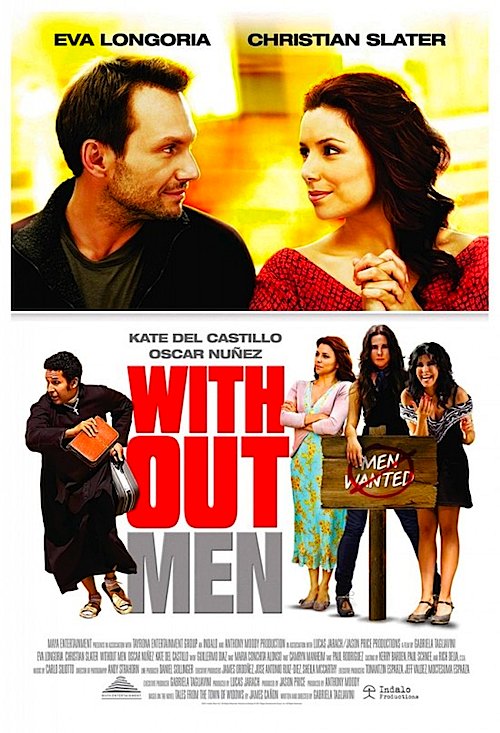 By Joe Bendel. In the sleepy Latin American village of Mariquita, the battle of the sexes is over. Essentially, the women have won by default. A win is still a win though. Indeed, it allows the new mayor to institute some radical changes in Gabriela Tagliavini’s Without Men (trailer here), which screens for a week in New York as part of the traveling Maya Indie Film Series.
By Joe Bendel. In the sleepy Latin American village of Mariquita, the battle of the sexes is over. Essentially, the women have won by default. A win is still a win though. Indeed, it allows the new mayor to institute some radical changes in Gabriela Tagliavini’s Without Men (trailer here), which screens for a week in New York as part of the traveling Maya Indie Film Series.
One fateful day, a band of Marxist guerillas arrive to liberate Mariquita. This entails shooting the mayor and forcibly impressing the rest of the village’s males into their ranks. Only the horndog priest is left behind in this village of supermodels. Rosalba should be the most distraught, since it was her husband who was executed. However, he was an unfaithful dog of a man, so good riddance. As she was always the brains behind his administration, she wastes no time in assuming office. Unfortunately, the rest of the village is at loose ends.
The first half of Without Men is likely to cause apoplexy among any women vaguely identifying as feminists. Incapable of even changing a light bulb on their own, the women of Mariquita basically sit around pining for some sexual healing. Naturally, to offend the Catholics in the audience, Father Rafael cons them all into believing the Holy Spirit has called him to ensure procreation continues unabated. Yet, once they boot him out of town (for running out of mojo), they start building a feminist utopia. This all sounds like a good story to the gonzo reporter who supplies the film’s framing device.
About ten seconds of internet research will reveal Eva Longoria makes out with another woman in Without Men. In fact, lesbianism becomes a major theme of the film. Even the great Maria Conchita Alonso gets in on the act. Frankly, her presence alone makes one far more predisposed to like the film. A truth-teller who has criticized the oppressive Chavez regime in her native Venezuela and its Hollywood cheerleaders, the film’s anti-Communist prologue must have appealed to her. However, aside from the general helpings of naughtiness (but nothing explicit), Without Men is fairly insubstantial.

In fact, Oscar Nuñez’s shtick as Father Rafael really is pretty offensive. Eva Longoria is game enough as the type-A Rosalba, but Kate del Castillo is rather pedestrian as her butchy new love interest. Frankly, they are both outshined by the dazzling Yvette Yates and Fernanda Romero, who have little to do except look hot, but they do that well. Christian Slater recycles his familiar slickster screen persona as the reporter likably enough, but Camryn Manheim is just embarrassing as his potty-mouthed boss.
Given all the teasing going on, the net result is certainly watchable. Tagliavini keeps everything bright and colorful, always showing her cast at the most flattering light. Ideologically, it is something of a mish-mash, which in itself is not necessarily a bad thing. There just is not much to it though, aside from Longoria’s scenes of you-know-what. One of the weaker installments of the Maya Indie Series, Without Men screens at the Quad Cinema in New York, once a day for a week, 7/29 through 8/4.
Posted on August 1st, 2011 at 3:15pm.
Nice review. But as added incentive to see the film I recommend the review in the UK’s Guardian blog:
http://www.guardian.co.uk/film/filmblog/2011/jul/20/without-men-film-trailer-review
Where the author gets muy hinky that there isn’t the default “you go girl” feminist subtext. Heh.
K – thanks for the link to the UK Guardian piece. The film was probably not intended by its director, producers or writers to be some sort of reactionary depiction of women, but that is certainly how it seems to come off. I’m sure they thought they were making a very progressive film.
I find it odd that that the readers commenting on the Guardian piece rave about how this is just another sign of how insulting Americans are to Latin Americans, even though the director of the movie was born in Argentina and the author of the novel it’s based on is a Colombian. Do people in the UK ever bother checking up on their facts when they engage in knee-jerk anti-Americanism?
I saw the film yesterday. Not only is it bad, but it’s also the antithesis of the social, political and gender questions wisely explored by Columbian author James Canon in his novel “Tales from the town of widows.” I was shocked to read that the director is from Argentina, and that she’s a woman. Her portray of Latin American women as voluptuous sluts with nothing on their heads but sex, is disrespectful, not only to Latino women but to women in general, and, of course, a disrespect for the author of the novel. Why buy film rights to a novel just to butcher it the way Tagliavini did?
Heather – you raise very good points. It is indeed disappointing when women directors use their hard-won capital as filmmakers to simply reiterate tired sexist stereotypes. Surely we have grown beyond that? From what you describe of Canon’s original novel, and from comments I’ve read elsewhere, Tagliavini certainly missed the opportunity to discuss the real issues that women face in fighting for social and political equality. I saw from her IMDB profile that her prior experience includes directing an episode of “Desperate Housewives,” which may be how she persuaded Eva Longoria to act in the film. Perhaps that experience on “Housewives” pushed her to go in a more sensationalistic direction? In any case, it seems to have backfired. It’s a shame, because I would like to see more films that explore the real challenges women face in exercising leadership in the world.